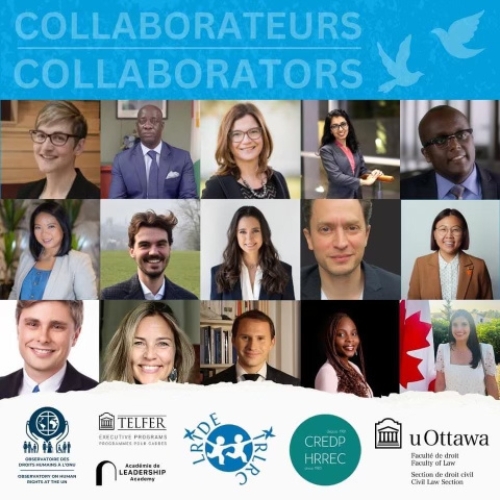The Observatory is directed by Professor Pascale Fournier, who contributes to the development of the Observatory's strategic plan in collaboration with the University of Ottawa, and oversees its academic outreach in terms of research, teaching, communications and fund-raising strategies. UN expert Ibrahim Salama assumes the role of Associate Director of the Observatory: he contributes to training programs through collaboration with targeted players, supervises students' work and ensures the Observatory's outreach in the international arena.

The Observatory on Human Rights at the UN
The UN Human Rights Observatory is an initiative of the Civil Law Section of the Faculty of Law at the University of Ottawa. Its goal is to support the work of UN treaty bodies through scientific reports prepared by outstanding students.
The program offers an innovative leadership path based on an experiential learning approach in an interdisciplinary and international framework. The Observatory collaborates with UN experts, the Leadership Academy, Telfer School of Management, HRREC, LRIDE, as well as Pilots and Collaborators recognized for their exceptional contributions to human rights.
The Observatory addresses three key needs: providing information to UN treaty bodies, training students, and democratizing knowledge for civil society.

Objectives

Observing and contributing to the progressive development of human rights in an applied fashion

Mobilizing new teaching approaches

Developing mentorship and enhancing networking

Disseminating knowledge by building bridges and democratizing human rights
Program and Pedagogy
Each year, the Observatory selects outstanding law students from the Bachelor of Laws (LL.B.) or graduate program (LL.M. or Ph.D.) and offers them an unprecedented leadership curriculum titled "Leading with Courage: Leadership and Human Rights", which is based on the pedagogical approach of experiential learning. Throughout the year, our students are trained by top experts from the Leadership Academy, the Telfer School of Management, the Human Rights Research and Education Centre (HRREC), the Interdisciplinary Research Laboratory on the Rights of the Child (LRIDE), as well as numerous Pilots (exceptional individuals whose inspiring careers have positively impacted Canada and the world) and Collaborators (experts recognized for their remarkable contributions to human rights).
Three teaching modules will enrich their experience: "The Roots of Leadership (Being)," "Leading Across Divides (Doing)," and "Leading Towards Systemic Change (Institutions)." Students will contribute to the work of the United Nations treaty bodies by producing and presenting scientific reports in Geneva, enabling them to be authentically engaged in activities that challenge them to experiment and adapt to dynamic issues within a multi-stakeholder, interdisciplinary, and internationally comparative framework. Upon their return from Geneva, they will democratize human rights in ways that are engaging and accessible to the general public, through podcasts, films, media interviews, conferences or other creative projects.
This pedagogical method fosters rare skills: thinking critically, holistically, and collaboratively; putting acquired knowledge into practice through concrete cases; navigating through a multiplicity of systems (the university, the United Nations, the general public); and implementing real and sustainable social change through innovative initiatives.
Module i explores the “roots of leadership” within oneself; how a deep understanding of one’s own beliefs, values and bias interconnect with emotional intelligence, empathy and integrity, and together form the bedrock of our ability to protect and advocate for human rights and social justice.
Module ii explores what it means to “lead across divides”: the vital roles of empathy, trust and collaboration; the power of telling compelling stories; and how to build divergent perspectives with respectful dialogue, overcoming conflict and upholding rights together.
Module iii explores the complexities of "leading for systemic change," exploring how leaders can navigate power dynamics, influence policy, and foster innovation to create lasting positive change. It emphasizes the importance of ethical leadership, creative problem-solving, and a deep commitment to serving the greater good, recognizing that true progress requires collective action and systemic transformation.


“The Observatory offers an unprecedented opportunity to contribute to international mechanisms for implementing human rights.”
Pascale Fournier - Head of the observatory
Team
- Pascale Fournier, Head of the Observatory
- Ibrahim Salama, Associate Director
- Nathan Reyes, Senior Advisor for Creative Content
- Coline Moreau, Special Advisor for Academic Content
- Laura Bucaro, Creative Support Assistant
- Simona Lombardo, Head of Media and Communications
- Kathy Dufour, Special Projects Advisor
- McKim Jean-Pierre, Special Project Advisor
- Rick Aiyer, Senior Advisor, Research and Knowledge Mobilization

United nations treaty bodies
United Nations Treaty Bodies
- Committee on the Elimination of Racial Discrimination (CERD)
- Committee on Economic, Social and Cultural Rights (CESCR)
- Human Rights Committee (CCPR)
- Committee on the Elimination of Discrimination against Women (CEDAW)
- Committee against Torture (CAT)
- Committee on the Rights of the Child (CRC)
- Committee on Migrant Workers (CMW)
- Subcommittee on Prevention of Torture and other Cruel, Inhuman or Degrading Treatment or Punishment (SPT)
- Committee on the Rights of Persons with Disabilities (CRPD)
- Committee on Enforced Disappearances (CED)



